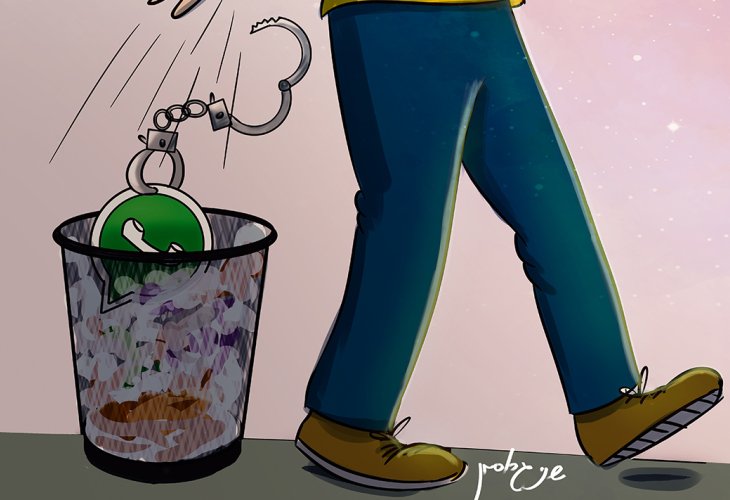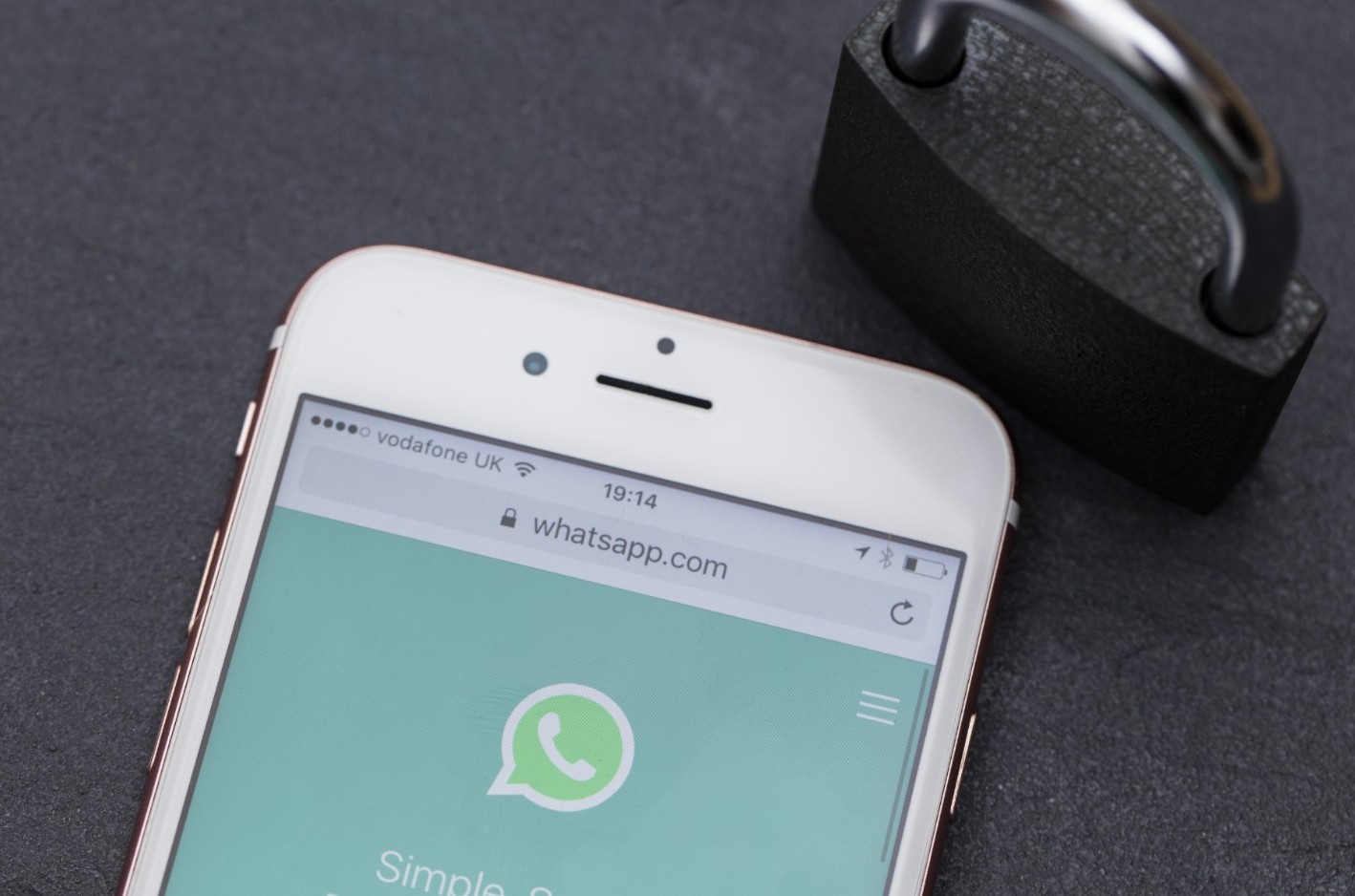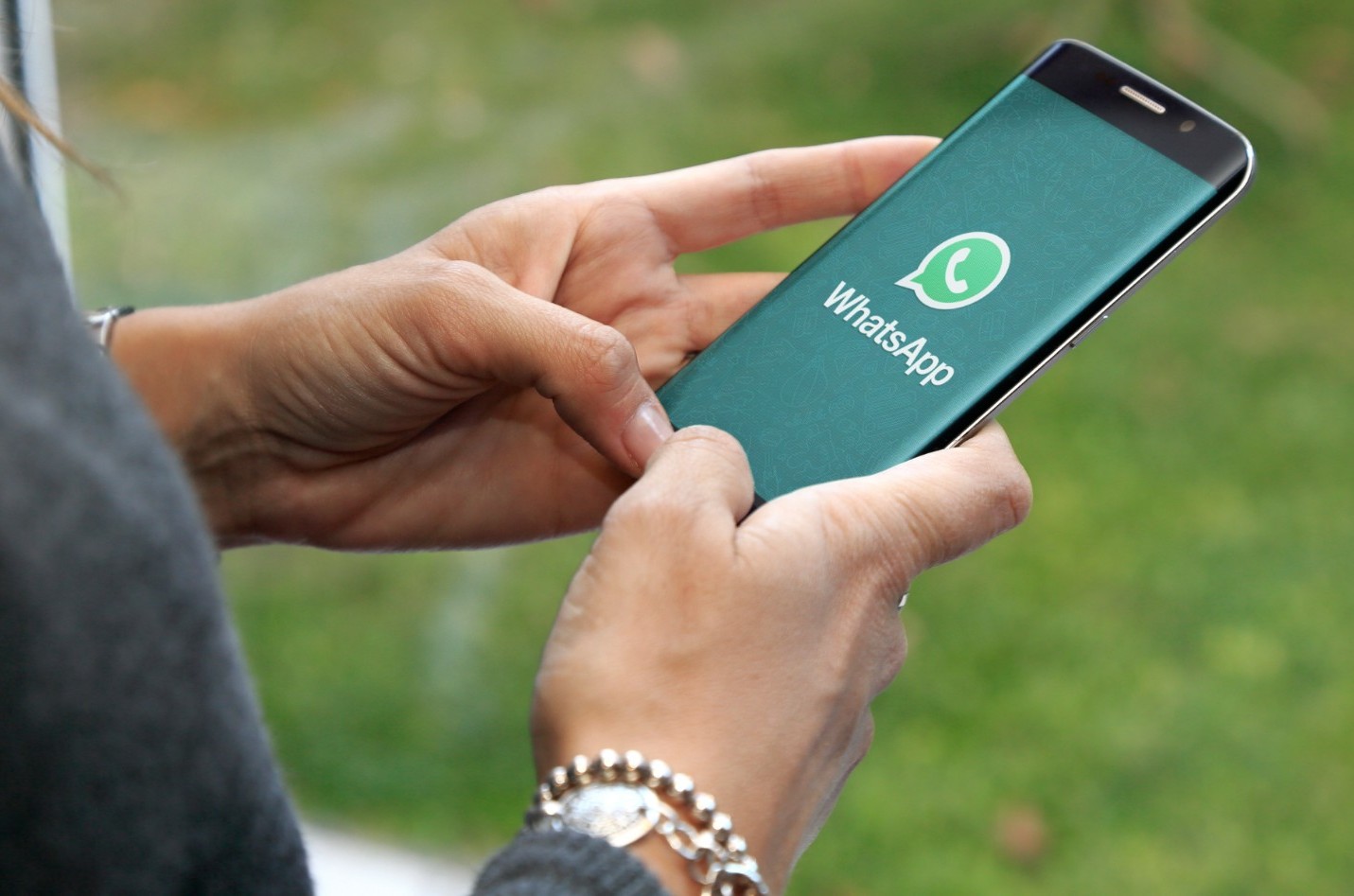"Not Missing It: It Was a Nuisance": Interviews with People Who Disconnected from WhatsApp
Phenomenon: More people are opting out of the free messaging app. "The situation became unbearable," says Yossi Ben Shoshan. For Ruhi Rosenblum, it wasn't a dramatic decision; Racheli Cohen concludes, "I want to experience life for real, not a poor imitation."
 Illustrated by Shani Grossman
Illustrated by Shani GrossmanYossi Ben Shoshan is the latest person to disconnect from the free messaging app WhatsApp, as interviewed for this article. It has been two weeks since his decision to disconnect. "I had been considering disconnecting from WhatsApp for a long time," he says. "It started with a few groups I was in, and the situation became unbearable. Every hour, at any time, every possible chatter, picture, and video. Notifications wouldn't stop. Irrelevant content was being sent at any given moment, and for me, it was just a nuisance. At some point, I decided to leave most of the groups I was part of and only stayed in the family group. But still, I felt it wasn't enough. On Motzei Shabbat Parashat Ki Tisa, I sent a message to all my contacts that I was quitting WhatsApp for good. I sent it and deleted the app, and since then, I have been enjoying the peace. It’s a completely different quality of life."
What led to this decision?
"One of the main considerations was the level of unfiltered content being sent. I didn't want to hurt others by blocking them one-sidedly. I decided to inform all my contacts I'd be happy to stay in touch through other means, like email or phone. So far, I don't regret it."
Ben Shoshan emphasizes that, in his view, it is a powerful and useful tool, but he insists that the risk of addiction sometimes outweighs the benefits. "You can do many good things via WhatsApp, with the click of a button you can send messages to whoever you want, but with such power comes such danger. The filter on my phone can't block all messages and images sent through WhatsApp, and I think it erodes users' values, even if they're not religious. It's exposure to harmful content and inappropriate language, without being able to block it all. The dissemination of images and videos today is astounding. The ease with which people can harm others through social media, with WhatsApp at the forefront, is unimaginable. And I haven't even mentioned wasting so much time, without noticing, on stupid gossip and slander."
 (photo: shutterstock)
(photo: shutterstock)Do you feel that this disconnection, from the center of things, is missing?
"I won't deny it, it’s a little missed sometimes, but it's a different quality of life. The peace and quiet without WhatsApp is addictive. And frankly, I'm not worried. Anyone who wants to reach me can do so easily even today."
Ruhi Rosenblum expresses similar sentiments, having celebrated Purim marking two years without WhatsApp. "For me, it was a conscious decision I made a month before Purim," she says. "Due to personal circumstances, I decided to take on a positive commitment and decided to disconnect from WhatsApp for a month. A few days after that month ended, I realized I didn't miss it at all. It wasn't a dramatic decision or anything like that, I just decided I didn't want to reconnect to WhatsApp as long as I didn't miss it. Two years have passed since, and I don't miss it."
Why of all commitments in the world, did you choose to disconnect specifically from WhatsApp?
"At that time, I was connected to many groups, in many of which I was at the center of things, among the first to share and write, and what led to this decision was the understanding that it consumed a lot of my daily time. I also hated all the chatter and gossips and shares. And the fact that if a woman was seen with a train on her sock, someone had already managed to photograph and spread her picture across all groups. I took upon myself to disconnect for a month, and I was surprised at how easy it was. Even today, there's no one preventing me from reconnecting to WhatsApp. No one is threatening me and no one decided for me to disconnect. I can reconnect at any moment, it just doesn't lack in my life."
What reactions do you receive from the environment?
"There are those who don't understand, those who say 'come on, stop posing and connect', but there are many more appreciative and even somewhat envious reactions. Look, I'm not a rabbi nor a saint, and I don't judge anyone, let each decide for themselves, but I enjoy seeing how my mind is clear for the home and children."
"I Gain Peace of Mind and Family"
Racheli Cohen is a painter and graphic artist, naturally swamped with clients, many wondering why she isn't on WhatsApp. She says the decision to disconnect from the app was mutual with her husband. "For livelihood purposes, I have a computer and kosher internet," she says. "But precisely because my work and my husband's, who works as a programmer, keep us around the computer a lot, we figured we don't need another screen. And truth be told, we found that we manage quite well without it. If I'm waiting in line at the bank or on a bus, I recite Tehillim or read a book I made sure to have in my bag. What's bad about that?"
How do you manage with clients without WhatsApp?
"We manage very well. The whole family around is connected on WhatsApp, and at some point, we concluded that at family gatherings, everyone is engrossed in the small screen in front of them. It doesn't suit me, I want to experience life truly, not a poor imitation of it. I'm not lacking in rabbit holes, nor missing social life, even though I don't have WhatsApp."
When asked if there are moments of temptation, considering connecting to WhatsApp to be part of family updates, Racheli answers with a smile. "Of course, there are such thoughts sometimes," she says. "The temptation never stops. Maybe not daily, but here and there, the thought arises that maybe it is worth connecting and being part of the family scene. But for now, I resist this temptation quite well. The gains from disconnection so outweigh the benefits that might come from connecting to this tool, that I prefer to stay without."
Some didn't disconnect from WhatsApp because they chose not to install it in the first place. Tamar Shalom, a second-year master's student at the Hebrew University, is one of them. "I am a social work master's student in a class that isn't very religious," she shares. "I began my studies after consulting a rabbi, of course. In every class I attend, the first thing they do is create a WhatsApp group. It's so easy and tempting for me to say I absolutely need it. Critical information is shared there, especially as an ultra-Orthodox student who finds higher education challenging. WhatsApp groups provide important material that helps prepare for exams, example questions, and more, and I'm always the odd one out, saying 'I have a plain phone, unlike a smartphone, please email me.' And most times, they look at me incredulously, not believing how I manage without WhatsApp. Usually, they try to include me too, but switching to email is difficult and outdated, and it doesn’t always work."
 (photo: shutterstock)
(photo: shutterstock)Are there times you feel you're losing out due to your choice not to connect to WhatsApp?
"It happens often," Tamar admits honestly. "Sometimes I have rebellious thoughts, especially before exams when I'm stressed and think yes, I'm going to buy a device and that's it. And sometimes there's this feeling that I'm left behind, aging while everyone races forward, and I'm plain, square, and annoying. But my life is truly important to me. In one of the courses I take, I study about the end of life, and I encounter death and redefine what I want to do with my life, and WhatsApp and this detachment from life are not included there. So yes, I might lose a few points in exams and a few more hours rummaging through material, but I gain a little more peace of mind. I gain family, I gain my children, I gain connection with my husband and gain vibrant flowing life."
"I Don't Want to be a Slave to My Work"
P', a senior government employee who manages several major entities in the Israeli economy, has steadfastly refused to join WhatsApp. "Why don't I have WhatsApp? Because I don't want to be enslaved," he says when asked about his decision. "I don't want people looking for me, I’m not interested in working 24/7. Even so, my daily schedule is busy and full, and I don't want to be a slave to my work. Often, I sit in important committees and internal discussions, amazed time after time how people are engrossed in the screen all the time. They're available for emails and messages at any moment. That's enslavement."
What reactions do you get regarding this decision?
"Just today, they asked me why I don't have WhatsApp. I was in a meeting at the Ministry of Interior and requested, as always, that the minutes and recommendations of the committee be sent to my email. The committee's legal counsel asked how I manage without it, and I replied that I want to be free. When it's urgent to reach me, you can easily do so in other ways — by phone or email. Amusingly enough, all those present in the room immediately began to apologize and explain they have no choice, and they simply must be updated, but would be very happy to disconnect from WhatsApp like I have."
Michal Arieli, a writer for the Hidabroot website, also shares that she manages well without WhatsApp. "Unfortunately, I see many people around me using WhatsApp," she says. "Actually, most people in my close circle do. In my opinion, it leads to an indescribable dependency. They're on groups and messages all day. I sit at parties in my children's kindergartens and see all the mothers around me texting and sending messages; they aren't even available to see their children. I sit in the garden with a friend, and we have a wonderful opportunity to talk, but she's engrossed in the screen. People inside can't see their addiction, but for me, as an outsider, it's glaring and shocking. How did someone explain to me when trying to persuade me to join? 'It's so easy, you're available all day, even in the bathroom you can reply to messages.' So there you have it. I don't want to be available all day, and I don't want the device to accompany me to the bathroom... I want to live my life in peace and tranquility."
How do you manage without WhatsApp, in a demanding job like yours?
"That is indeed the great trial. People assume and take it for granted that I have WhatsApp. They don't even bother to check; they just try to send messages. Of course, my rigorously kosher phone doesn't receive them. Many people I correspond with have no idea how to send pictures via email, as they want to send with a click of a button, and I'm complicating things for them. From spokespersons of various bodies and organizations, I constantly hear surprise: 'Do you really mean you have no WhatsApp?'"
Do you ever have doubts or thoughts that maybe you should just give in?
"Yes. Sometimes after tiresome communication with someone throughout a whole morning, who just needs to send a picture or response, and there's no other way to send it than WhatsApp, I have doubts. Today I have a simple kosher Nokia phone. I've had it for a decade. It's clear to me that the day it passes on, I'll need to buy a new device, and most likely I'll have to buy a protected device but one that allows WhatsApp messages. I really don't want to reach that point, so I guard my beloved phone vigilantly. I've had a few open miracles with it. Once, I was driving in town and inadvertently it fell from my vehicle, I turned to the other lane to go back and look for it. Meanwhile, trucks, buses, and whatnot passed by? Amazingly and shockingly, the phone remained on the road. Intact and unscathed. I feel there's divine assistance helping me keep it."
Do you sometimes feel you're missing out, not being in the loop?
"Yes. My husband's family has a very close-knit and active WhatsApp group. There have been several occasions we found out about close family events like a birth or engagement much later than everyone else, and when we wondered why we weren't informed, they said, 'We announced it.' Through WhatsApp, of course."
What reactions do you get from your environment about this decision?
"People greatly appreciate it, but honestly, the environment interests me less. It's not what influences my decisions."

